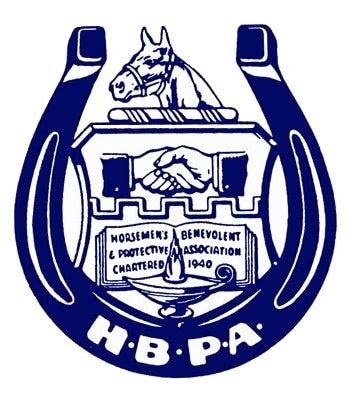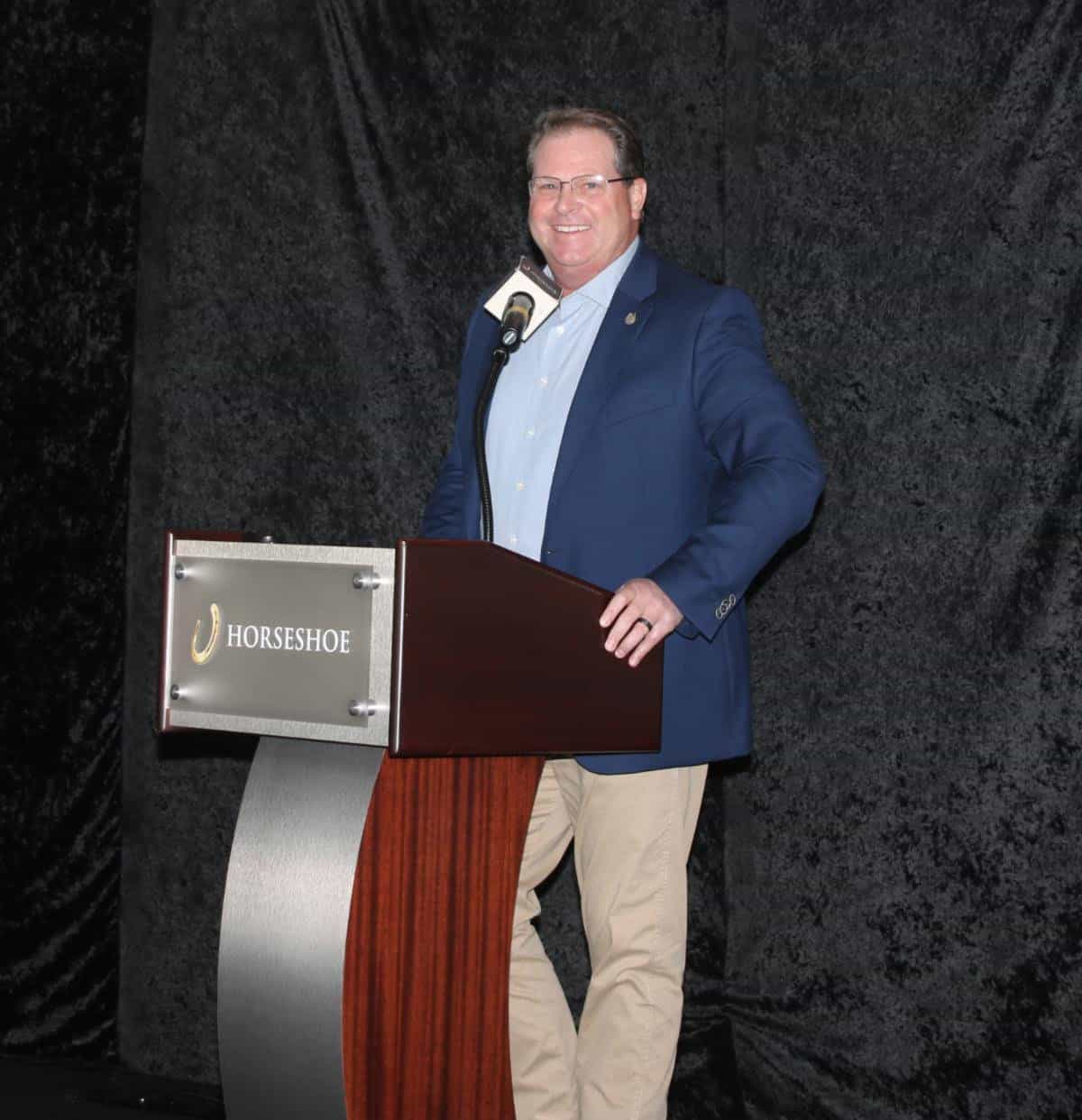‘It is Destined for Failure,’ Oklahoma Lawmaker says of HISA at National HBPA Conference

Photo by Denis Blake/National HBPA
The National HBPA’s National Conference at Oaklawn Racing Casino Resort broke from the gate Wednesday with a panel on the Horseracing Integrity and Safety Act entitled “HISA: Where are we now?”
It was a question largely answered with more questions, as has been the case with much of the dialogue about HISA since the legislation was passed and signed into law by former President Donald Trump in late 2020 as part of the massive COVID relief bill. The legislation requires the law to go into effect July 1.
“I spend my days these days on the phone answering the same question: ‘What will HISA do?’” said Ed Martin, president and chief executive officer of the Association of Racing Commissioners International, a trade association representing racing regulators. “The answer is ‘anybody’s guess,’ and the fact that I’m saying that should be troubling to everybody.”
Martin and the three attorneys on the panel were very clear in their views of the problems and issues facing the legislation’s launch by the Horseracing Integrity and Safety Authority (also known as HISA). Peter Ecabert, the longtime general counsel of the National Horsemen’s Benevolent & Protective Association, moderated the panel, with Martin joined by Pete Sacopulos, an equine attorney from Terre Haute, Ind., and Chris Kannady, a member of the Oklahoma House of Representatives who also serves as Staff Judge Advocate for the Oklahoma National Guard.
Kannady, a former Marine who served in Afghanistan, called HISA “a snake in the grass” snuck into a 6,000-page bill.
“Each and every state legislature, I don’t care if you’re a Republican or Democrat (the question is going to be): who is going to pay for this?” he said. “… Usually what happens with the federal government is they show up and say ‘We want you to do this federal program. But we’re going to give you 10 times what you put into the program.’ … Here they’re saying, ‘Here’s our law. You go pay for it.’ There’s no way in hell state legislators are going to hand over a bunch of money … to the federal government to run a federal program.
“It is never going to happen. It is destined for failure.”
Kannady said the funding will fall to the state racing commissions, which he predicted would pass on the costs to the horsemen and the tracks.
HISA faces two federal lawsuits challenging its constitutionality: one filed by the National HBPA and 12 of its state affiliates in Lubbock, Texas, and one filed by Oklahoma, West Virginia and Louisiana and supported by six additional states in Lexington, Ky.
Sacopulos is representing the North American Association of Racetrack Veterinarians in its support of the National HBPA’s lawsuit. He cited four constitutional challenges:
// The Constitution’s non-delegation doctrine that says Congress is the branch that makes the laws. “So we cannot have Congress delegating the power to make laws to some private entity, and that’s what has occurred. here,” Sacopulos said.
// The appointment clause: “Who appointed the Authority?” he said. “In this case, we had a private entity appoint its own people. That runs afoul of the appointment clause in our constitution, which says if you’re dealing with an agency, the executive branch of government should be making those appointments.”
// The anti-commandeering provision: “Which says the federal government should not come in and take over state-run agencies and authorities,” he said.
// The due-process argument. Sacopulos said that is best demonstrated by how the disciplinary process works now and how it would work under HISA.
“Most states have an administrative and judicial combination of what happens if you’re accused of a violation,” he said, referencing the process of a stewards hearing and appeals to the commission before a racing participant can turn to court.
Sacopulos said that under HISA, the process starts with a review by the Authority, which, if a violation is determined to have occurred, turns it over to administrative law judge appointed by Federal Trade Commission.
If there is an adverse ruling, he said the FTC has no requirement to hear the case and the next stop would be the U.S. Court of Appeals.
“Let me tell you, for the U.S. Court of Appeals, the average cost is $20,000 to $50,000,” Sacopulos said. “… Due process is the right to be heard in a meaningful way within a meaningful time. What you’ve done is create a cost barrier that most people simply can’t pay.
“There’s no guarantee right to review,” he continued, adding, “and every one of these violations is now a federal violation, no matter how minor it might be.”
Eric Hamelback, CEO of the National HBPA, in his introduction of the panel said that his organization has been unfairly portrayed as being “off-base” in finding flaw with HISA. He called HISA “the new four-letter word that is giving all of us a lot of uncertainty.
“Lack of transparency, fear of unknown costs, lack of expertise in writing the rules certainly gives us a lot of cause for uncertainty,” he said. “…. We want transparency. Is that off-base?…. We wanted a seat when writing the rules, and I think everyone in this room knows we have none. The HBPA wants equal representation. We’re not trying to run the show, but we certainly got run out of the room… In my opinion, they just don’t want us playing their game.”
Martin said state racing commissions won’t go away under HISA but their role would change. “We don’t make laws. We implement them and we enforce them,” he said. “Our bottom line here is we don’t want to see this turning into a mess — and that might be way beyond our control.”
Sacopulos said no matter how the federal courts rule, an appeal is a virtual certainty.
“I firmly believe there’s there is a strong chance we’re going to get a favorable ruling,” he said. “But then the question is: what’s next? I think collectively we need to know what our next move is going to be. What’s our proposal for a solution? In these types of situations, you always need to be thinking ahead.”
Hamelback said the National HBPA has never said it inherently is opposed to federal legislation but that it’s vital to find out if HISA is legal. Otherwise, he said if rules violators are sanctioned under HISA, only to have the law declared illegal, “they walk away scot free.”
“Nobody in the HBPA has any problem with national uniformity based on science,” he said. “Do we have a problem with something being illegal? Hell yeah we do…. We have to do our due diligence now.”
Hamelback expressed frustration at accusations that the National HBPA is only fighting HISA without providing constructive alternatives as the industry grapples to create real reform and achieve uniformity of its medication rules, safety standards and enforcement.
“I have offered solutions until I’m blue in the face,” Hamelback said. “Solutions don’t necessarily end with federal legislation. Nobody has ever jumped up and down and said we would not have federal legislation. What’s written now, we don’t think it’s legal. I don’t think it’s legal. But if we have the rules in place and they’re put there by science, hey, that is part of the solution. Tell us why you’re banning Lasix. Certainly you can point toward the international world. But that’s not science.
“I’ve written a white paper on putting all the national uniformity laboratories under the Department of Agriculture…. There’s your uniformity. There are a lot of solutions that have been put out on the table. Those of you who read the vast majority of the media, you’re not going to get that. But … I am working my ass off to find solutions. They may not get out in the press. I don’t have the massive PR that everybody else does. But we’re trying very hard to find the solution. This act is not the solution.”
The conference’s regular programming runs through Friday, with the National HBPA’s board meeting Saturday. The event is being held in Oaklawn’s hotel overlooking the track’s first turn.





